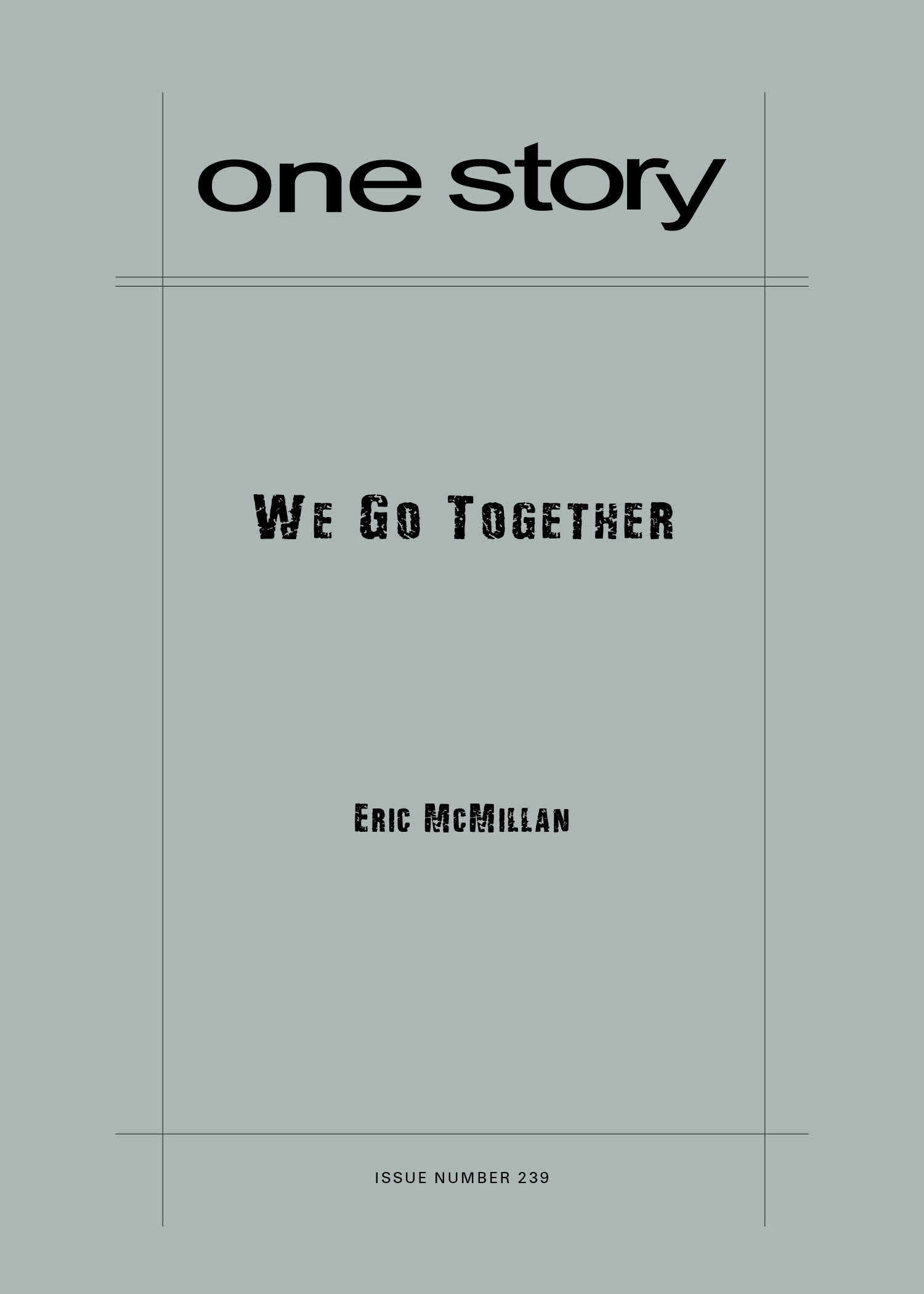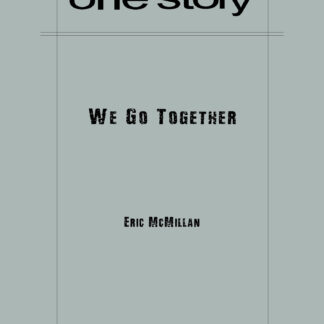
We Go Together
$2.50
86 in stock
Excerpt
One morning, about three months into my yearlong tour of duty, a North Korean border guard turned himself in at a checkpoint along the DMZ. To avoid getting shot for desertion, he’d snapped the other sentry’s neck, snipped the electric fence, and crawled through rows of razor wire, crouched and halting every few steps to look back and see if he’d been detected. All night he crossed that minefield. Two and a half miles, step by careful step. And when he arrived at the checkpoint—shaken up, bruised, cut, and badly dehydrated—he stared past the bewildered roving patrol and asked if he could eat the bowl of scraps left out for the German Shepherd. I’m told he laughed off most of his interrogation but that, almost in spite of himself, he couldn’t stop hurling insults at the American intelligence officer present. That’s how they knew he wasn’t a spy.
Pak, our liaison from the South Korean Army, explained it to me this way: “We all hate you, mee gook,” he said. “It just the North Korean more honest about it.”
Eric McMillan
Eric McMillan served two combat tours in Iraq and commanded an infantry company there during “The Surge” from 2007 to 2008. Other assignments included peacekeeping in Bosnia, protocol at the UN headquarters in Seoul, and coordination with the Royal Thai Army. He’s received support from the Richard Hugo House in Seattle and the Bread Loaf Writers Conference, and his fiction has appeared in Gulf Coast, Witness, and, most recently, New England Review. A civilian, he now enjoys a much quieter life with his family in Seattle.
Will Allison on “We Go Together”
I was first drawn to Eric McMillan’s “We Go Together” by the story’s setting—a U.S. army base, 1996, near the Korean Demilitarized Zone—and by the author’s résumé, which includes ten years of military service in Bosnia, Korea, and Iraq. I was hoping the story might inform my understanding of present-day tensions between the United States and North Korea, which it did. But it turns out the story’s chief mission is much broader: an exploration of race relations within the U.S. Army.
“During the lead-up to the invasion of Iraq,” says McMillan, “I was assigned to a battalion support platoon. Most of those soldiers were African-American, eighteen- to twenty-year-olds. I was a white, twenty-four-year-old college kid in a position of power. If that scenario sounds inherently problematic to you, it is. But in the army, you’re not supposed to act like it is.”
Though “We Go Together” is set in Korea, McMillan draws heavily upon his experience in Iraq. The story’s central relationship involves Lieutenant Woods, a white officer assigned to transform a motley, mostly black platoon, and Sergeant Burrell, a respected black section leader who chafes at Woods’s by-the-book leadership style. When crisis befalls the platoon, the two men’s capacity to work together is put to a high-stakes test.
Along the way, the story mines the inherent tension between the army’s ethos of meritocracy and its reluctance to acknowledge institutional racism. There’s also a lot of fascinating army-speak, which is its own kind of poetry. We hope you enjoy McMillan’s ear for language—and his story—as much as we did.
Q&A by Will Allison
- WA: Where did the idea for this story come from?
- EM: Although I knew I wanted the central conflict of the story to be about racism, I couldn’t really approach the material until I set it in Korea. My own yearlong tour there (an office job in Seoul) thrust me into the culture; it forced me to get outside myself and my thinking as an American. Years later, when I began writing this story, it was perspective that I desperately needed. There is such a thing as being too close to the material. During the lead-up to the invasion of Iraq, I was assigned to a battalion support platoon. Most of those soldiers were African-American, eighteen- to twenty-year-olds. I was a white, twenty-four-year-old college kid in a position of power. If that scenario sounds inherently problematic to you, it is. But in the army, you’re not supposed to act like it is. The army idealizes itself. And yet, as an institution, it never reconciles itself to the fact that it depends on a rigid class structure and an oversized belief in meritocracy. Our army is a microcosm of our democracy: that’s what makes it great and also sometimes ugly. I needed a different lens. I needed to trick myself. I needed to take what was familiar and place it out of context. That’s what you allow yourself to do when contrasting a smaller personal conflict against a larger political drama. I tracked the way Kim Jong-un followed his father’s playbook, and working those details into the plot freed my imagination. It was a way of distracting myself into writing the story. Curiously, as I wrote it, I found that distraction was also, in a sense, the story I was telling.
- WA: What was the most challenging aspect of writing this story?
- EM: When writing about racism from a position of privilege, I think it can be easy to fixate on the many potential pitfalls. Am I going to sound ignorant or naïve? Do I say something safe, that feels right but that lacks true power? Or worse, what if I say something harmful? If I write a character or a narrator who practices a form of willful ignorance that’s racist, how do I write in such a way that the story acknowledges the prejudice? Can I do that without inserting authorial judgment and still let the story speak for itself? How do I protect the dignity of every character, especially those marginalized by the narration? Can I protect the dignity of every character without appearing to condone every act? What if my point requires an indignation? You must, absolutely, investigate your work from all angles. But maybe one should value nuance over absolutes. Good fiction should challenge us to hold more than one idea or position in our heads simultaneously. Why stage a conflict for your reader if she’s not going to walk away from the story feeling conflicted? I don’t mean confused—I mean alive to the clash of irreconcilabilities in our hearts.
- WA: How does your present writing life compare to your past military life?
- EM: I’ve adopted the stance of an old campaigner—the benefit, I suppose, of having to wage a counterinsurgency in the midst of a sectarian civil war, in a country with an ambiguous operating environment full of intrigue and shifting alliances. Every day, I go out to face the enemy—not a physical enemy anymore, but the difficulties in the work itself and the endless setbacks and bottomless self-doubt. Some days, I bring the fight. Some days, the enemy brings the fight to me. Some days, I get my ass kicked. Take the long view; battles, in themselves, are seldom decisive. Patience and perseverance matter. It helps if you’re stubborn.
- WA: One thing I love about “We Go Together” is that, on one level, it’s a workplace story, not just a war story. It’s about a guy trying to do his job; the workplace just happens to be the U.S. Army. In this way, the story is quite different from works such as Norman Mailer’s The Naked and the Dead, Tim O’Brien’s The Things They Carried, Thom Jones’s “The Pugilist at Rest,” and so many others. Was this a conscious choice?
- EM: Some of my favorite stories portray a version of army life that doesn’t actually involve combat. “The Barrack’s Thief” by Tobias Wolff. “Able, Baker, Charlie, Dog” by Stephanie Vaughn. Or “Jody Rolled the Bones” by Richard Yates. Salinger’s “For Esme—With Love and Squalor.” And I’m especially thinking of Philip Roth’s “Defender of the Faith,” another story in which the guy in charge faces an ethical dilemma where the type of “by-the-book” answer that the army might provide him feels perilously thin. For me, even when the action takes place far from the battlefield, an army story is a war story. Indelibly so. Those characters are haunted by a war that’s either waiting for them, just over the horizon, or that refuses to stay entirely in the rearview mirror. War is dark matter; it provides the pull of a negative weight. I made a very deliberate choice to visit Afghanistan in “We Go Together.” Part of what I’m trying to examine obliquely is how previous wars—for Woods, echoes of Korea and Vietnam—give rise to the wars that follow, if not geopolitically, then in terms of psyche. That’s why I felt it important to encounter Woods later in his career (on the border of Pakistan, circa 2009). Because demons beget demons. And as a veteran, as a writer, I’m concerned with how we got here, after seventeen years of continuous conflict, on the verge of a potentially catastrophic showdown against the Kim regime. Can what I do be considered a “workplace story,” or even a “war story?” Yes. But what I write about are ghosts.
- WA: Another thing I enjoyed about this story was being immersed in (for lack of a better term) “army-speak,” that colorful argot of acronyms, technical terms, and irony. Could you talk about the role of army language in your work?
- EM: There’s a constant negotiation where you’re weighing accessibility against authenticity. Usually, I come down on the side of the latter. I think of it as an act of faith in my readers. Eliot said that good poetry “communicates before there is understanding.” I’m sharing what I hear, the poetry in how soldiers speak. I want to evoke rather than employ.
- WA: How long did it take you to complete this story?
- EM: The initial draft occupied me for a season, two or three months. Revision took two years.
- WA: What are you working on now?
- EM: Like just about every fiction writer I know, I’m “working on a novel,” which means I’m closer to finishing a collection of stories. Oddly enough, writing about Iraq has led me further afield and drawn me intensely into the larger world.
- WA: What is the best bit of advice about writing you have ever received?
- EM: Jim Shepard, who is my absolute hero, says this all the time during workshop: “The story is smarter than you are.” He’s referring to revision, how easy it can be to spin our wheels by futzing with sentences when often what’s required of us means facing “the hard stuff”—every place we’ve fooled ourselves into thinking we’ve solved the emotional work of our characters or the thematic concerns our stories demand. Nine times out of ten it’s already on the page, in the draft in front of us, evidence that our subconscious minds are problem solving even if we haven’t caught up yet. It’s hard as hell, learning how to read your own work. But what Jim rightfully points out is that until we do so, we never truly allow our work to teach us what it needs to say.
